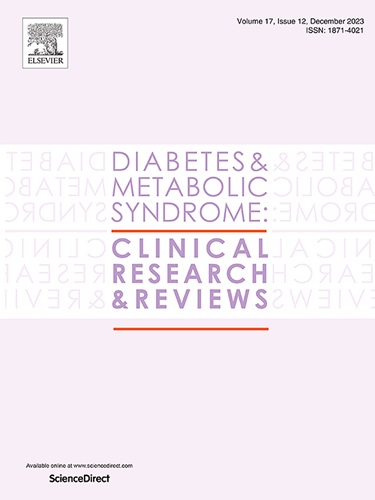Association of dietary manganese intake with new-onset chronic kidney disease in participants with diabetes
IF 4.3
Q1 ENDOCRINOLOGY & METABOLISM
Diabetes & Metabolic Syndrome-Clinical Research & Reviews
Pub Date : 2024-10-01
DOI:10.1016/j.dsx.2024.103138
引用次数: 0
Abstract
Background
We explored the association of dietary manganese (Mn) with new-onset chronic kidney disease (CKD) in participants with diabetes on different glycemia control status and potential mechanisms.
Methods
The study included 7248 adults with diabetes from the UK Biobank who had complete dietary data and were free of CKD at baseline. Dietary information was collected by the online 24-h diet recall questionnaires. The primary outcome was new-onset CKD.
Results
565 (7.8 %) participants developed new-onset CKD during a median follow-up of 11.96 years. Overall, there was a significantly inverse relationship of dietary Mn intake with new-onset CKD in individuals with diabetes at glycated hemoglobin (HbA1c) ≥6.5 % (per SD increment, HR [95%CI]: 0.79 [0.68-0.91]), but not in people with diabetes at HbA1c <6.5 % (per SD increment, HR [95%CI]: 1.07 [0.90-1.29]; P for interaction = 0.004). In individuals with diabetes at HbA1c ≥6.5 %, body mass index and waist circumference significantly mediated the association between dietary Mn intake and new-onset CKD, with mediated proportions of 17.5 % and 17.4 %, respectively.
Conclusions
Higher dietary Mn intake was significantly associated with a lower new-onset CKD risk in participants with diabetes at poor glycemic control status. The inverse association was mainly mediated by obesity. If further confirmed, our findings underscore the importance of maintaining adequate dietary Mn intake for the primary prevention of new-onset CKD in patients with diabetes, especially those with poor glycemic control.
膳食锰摄入量与糖尿病患者新发慢性肾病的关系
背景我们探讨了膳食中的锰(Mn)与不同血糖控制状况的糖尿病患者新发慢性肾病(CKD)之间的关系以及潜在的机制。方法该研究纳入了英国生物库中的 7248 名成人糖尿病患者,他们拥有完整的膳食数据,基线时无 CKD。饮食信息通过在线 24 小时饮食回忆问卷收集。结果在中位 11.96 年的随访期间,有 565 人(7.8%)患上了新发的慢性肾脏病。总体而言,在糖化血红蛋白(HbA1c)≥6.5%的糖尿病患者中,膳食中锰的摄入量与新发慢性肾脏病之间存在明显的反向关系(每标准差增量,HR [95%CI]:0.79 [0.68-0.91]),但在 HbA1c <6.5% 的糖尿病患者中则没有这种关系(每标准差增量,HR [95%CI]:1.07 [0.90-1.29];交互作用的 P = 0.004)。在 HbA1c ≥6.5 % 的糖尿病患者中,体重指数和腰围对膳食锰摄入量与新发 CKD 之间的关系有显著的中介作用,中介作用比例分别为 17.5 % 和 17.4 %。这种反向关联主要是由肥胖介导的。如果得到进一步证实,我们的研究结果强调了保持足够的膳食锰摄入量对于糖尿病患者,尤其是血糖控制不佳的患者预防新发慢性肾脏病的重要性。
本文章由计算机程序翻译,如有差异,请以英文原文为准。
求助全文
约1分钟内获得全文
求助全文
来源期刊

Diabetes & Metabolic Syndrome-Clinical Research & Reviews
ENDOCRINOLOGY & METABOLISM-
CiteScore
22.90
自引率
2.00%
发文量
248
审稿时长
51 days
期刊介绍:
Diabetes and Metabolic Syndrome: Clinical Research and Reviews is the official journal of DiabetesIndia. It aims to provide a global platform for healthcare professionals, diabetes educators, and other stakeholders to submit their research on diabetes care.
Types of Publications:
Diabetes and Metabolic Syndrome: Clinical Research and Reviews publishes peer-reviewed original articles, reviews, short communications, case reports, letters to the Editor, and expert comments. Reviews and mini-reviews are particularly welcomed for areas within endocrinology undergoing rapid changes.
 求助内容:
求助内容: 应助结果提醒方式:
应助结果提醒方式:


